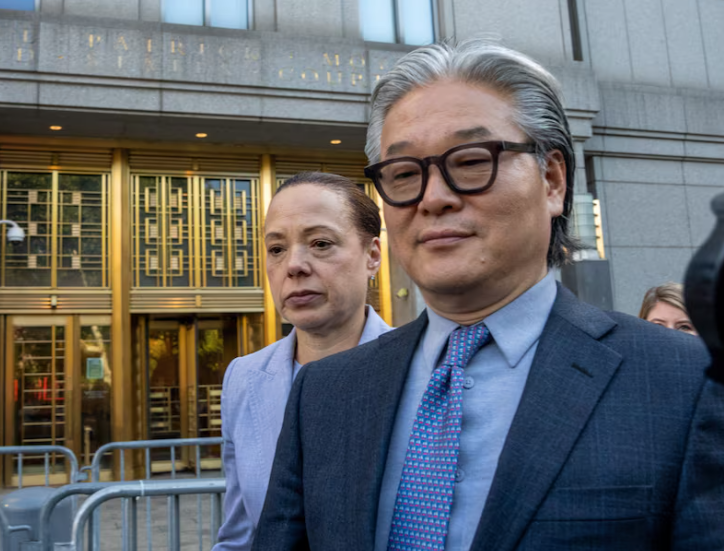A jury in Manhattan federal court convicted Archegos Capital Management founder Sung Kook “Bill” Hwang of fraud and other charges on Wednesday. Prosecutors accused him of market manipulation ahead of the 2021 collapse of his $36 billion private investment firm. The jury, which began deliberations on Tuesday, found Hwang guilty on 10 of 11 criminal counts and his deputy, Patrick Halligan, guilty on all three counts he faced. Hwang and Halligan, flanked by their lawyers, listened as the verdict was read by a soft-spoken foreperson.
U.S. District Judge Alvin Hellerstein set the sentencing for Oct. 28, allowing both men to remain free on bail. The Archegos meltdown sent shock waves across Wall Street and drew regulatory scrutiny on three continents. Prosecutors argued that Hwang and Halligan lied to banks to obtain billions of dollars, which they used to artificially inflate stock prices of multiple publicly traded companies. The trial began in May.
Damian Williams, the U.S. attorney in Manhattan, emphasized that the verdict should send a clear message that his office will hold accountable those who “think they can cheat the system.” Hwang, 60, had pleaded not guilty to one count of racketeering conspiracy, three counts of fraud, and seven counts of market manipulation. The jury acquitted him on a market manipulation charge related to the Chinese online video company iQIYI.
Halligan, 47, had pleaded not guilty to one count of racketeering conspiracy and two counts of fraud. Halligan served as the chief financial officer at Archegos. Both men now face maximum sentences of 20 years in prison for each charge they were convicted of, although any sentence will likely be lower and determined by the judge based on various factors.
The trial focused on the implosion of Hwang’s family office, Archegos, which inflicted $10 billion in losses at global banks and, according to prosecutors, caused more than $100 billion in shareholder losses at companies in its portfolio. Prosecutors argued that Hwang’s actions harmed U.S. financial markets and ordinary investors, causing significant losses to banks, market participants, and Archegos employees.
Prosecutors revealed that Hwang secretly amassed outsized stakes in multiple companies without actually holding their stock. He lied to banks about the size of Archegos’s derivative positions to borrow billions of dollars, which he and his deputies then used to artificially inflate the underlying stocks. They accused Halligan of lying to banks and enabling the criminal scheme.
During closing arguments, Assistant U.S. Attorney Andrew Thomas told jurors, “By 2021, the defendants’ lies and manipulation had ensnared nearly a dozen stocks and half of Wall Street in a $100 billion fraud, a fraud that came crashing down in a matter of days.” Hwang’s defense team described the indictment as the “most aggressive open market manipulation case” ever brought by U.S. prosecutors. Hwang’s attorney, Barry Berke, argued that prosecutors had criminalized aggressive but legal trading methods.
Archegos head trader William Tomita and Chief Risk Officer Scott Becker testified as prosecution witnesses after pleading guilty to related charges and agreeing to cooperate in the case. Prosecutors said Hwang’s positions eclipsed those of the companies’ largest investors, driving up stock prices. At its peak, they said Archegos had $36 billion in assets and $160 billion of exposure to equities.
When stock prices fell in March 2021, banks demanded additional deposits, which Archegos could not make. Banks then sold the stocks backing Hwang’s swaps, wiping out an alleged $100 billion in value for shareholders and billions at the banks, including $5.5 billion for Credit Suisse, now part of UBS, and $2.9 billion for Nomura Holdings. Nomura declined to comment, and UBS did not immediately reply to a request for comment.
Wednesday’s conviction marked the second fall from grace for Hwang. Before Archegos, Hwang worked at Tiger Management, billionaire Julian Robertson’s pioneering hedge fund, before launching his own hedge fund business, Tiger Asia Management, in 2001. Tiger Asia grew quickly, but losses and regulatory issues in Hong Kong and the United States led the firm to shut down in 2012. Hwang pleaded guilty to wire fraud related to illegal trading of Chinese stocks and paid $44 million to settle U.S. insider trading charges. He then turned Tiger Asia into a family office, renaming it Archegos Capital Management in early 2013. Wall Street banks initially wary of Hwang due to his regulatory issues eventually gave him a second chance, starting with Japan’s Nomura.

